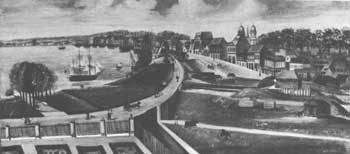






Historical Background
The French: Trappers and Traders (continued)
OUR FRENCH HERITAGE
Our heritage is richer because of the men of France who came to this continent and explored and settled the wilderness. The breadth of their achievements and the depth of the heritage they bequeathed to the United States transcends their small numbers. A substantial part of this heritage was mixed into the mainstream of America through 6,000 unhappy Acadians, who were expelled in 1755 from Acadia (Nova Scotia) by the British, its new rulers under the terms of the Treaty of Utrecht. The Acadians at first scattered throughout the British colonies, from Maine to Georgia, hut most of them finally settled in Louisiana. Henry Wadsworth Longfellow's poem Evangeline, an epic about the Acadian odyssey, is the most widely known tribute to the French heritage in the United States.
Other persecuted Huguenots, also seeking refuge and religious freedom, contributed another equally important segment of our French heritage. They settled in clusters from Rhode Island to South Carolina, especially in Charleston, and enriched the cultural patterns evolving in the colonies. Therefore, much of the flavor of France in the United States today stems not from areas that once were French colonies but from French settlers in the British colonies.
 |
| New Orleans, in 1803, viewed from the Plantation of Marigny. From a painting by Boqueto de Woieseri. (Courtesy, Chicago Historical Society.) |
In the final analysis, the city of New Orleans is the heart of French influence. The Illinois settlements quickly lost their French characteristics, but southern Louisiana clung to French customs and traditions. Today, more than a century and a half after the Louisiana Purchase, French is still spoken in New Orleans and many parts of Louisiana. Roman Catholicism remains the principal religion. Even the political subdivisions of the State are called parishes, not counties. Much of the legal code is rooted in the Roman law of France rather than the common law of England, which prevails elsewhere in the United States. Proud Creoles have cherished their traditions, and through them a happy combination of graciousness and gaiety has filtrated into American life. Mardi Gras, first celebrated by Bienville's colonists in 1702, has been a regular part of Louisiana life ever since and has been enjoyed by many Americans.
French place names, scattered from the Rockies to the Alleghenies, are a constant reminder of the golden era of the voyageurs and coureurs de bois, whose songs are still sung. Evidences of French colonial architecture still remain in Louisiana and other places in the Mississippi Valley.
 |
 |
http://www.cr.nps.gov/history/online_books/explorers-settlers/intro17.htm
Last Updated: 22-Mar-2005